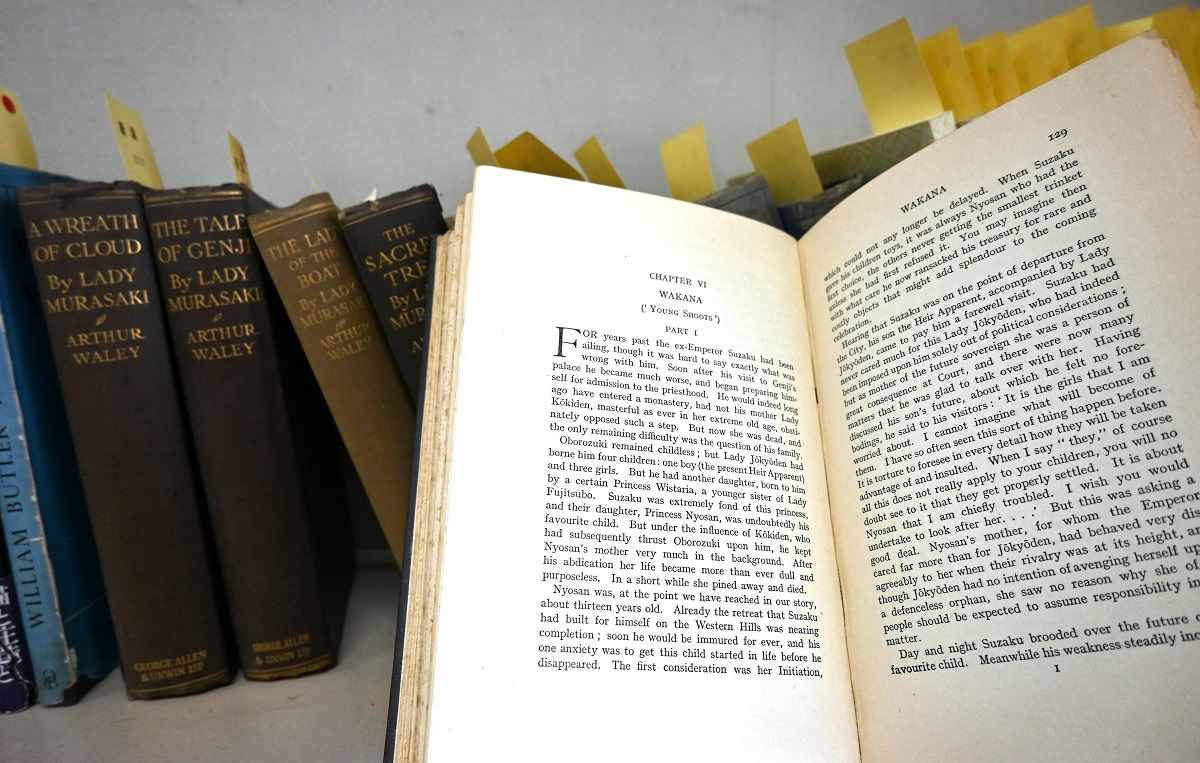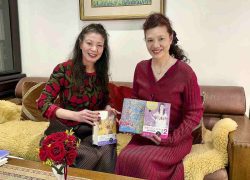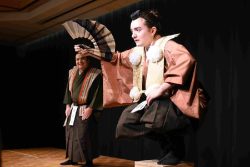Unearthed Article by Donald Keene Portrays Life in ’50s Kyoto; Bonds and Feuds with Japanese Writers Also Described
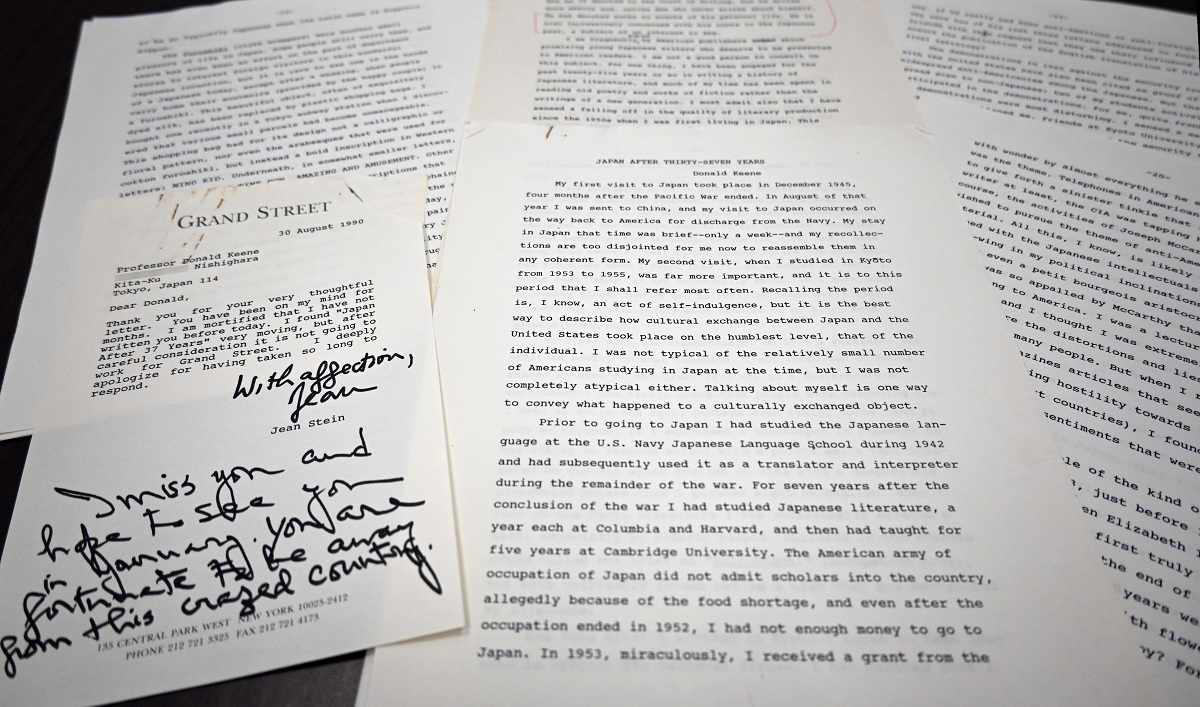
The manuscript for “Japan after Thirty-seven Years,” found by the Donald Keene Memorial Foundation while sorting through his belongings. At lower left is a letter from the editor of the Grand Street literary magazine.
13:31 JST, February 5, 2024
In an unpublished manuscript, Donald Keene recalled with humor his daily life in 1950s Kyoto, his encounters with traditional culture, and his gratitude to many Japanese writers, including Yukio Mishima and Kobo Abe, who befriended him and encouraged him on his path of Japanese literary scholarship. Keene, who introduced the pleasures of Japanese literature to many around the world, died in 2019 at age 96. The manuscript was found among his belongings by the Donald Keene Memorial Foundation.
“Recalling the period is, I know, an act of self-indulgence,” Keene writes in the manuscript’s opening, “but it is the best way to describe how cultural exchange between Japan and the United States took place on the humblest level, that of the individual.”
“Japan after Thirty-seven Years,” which comes to 32 pages, was produced on a typewriter in English. It was rejected by the Grand Street literary magazine, which went defunct in 2004. Seiki Keene, the late writer’s adopted son, found the article in a file on Dec. 7 last year. With it was an airmail envelope and a letter from the magazine’s editor dated August 30, 1990, apologizing for not publishing the piece.
In the summer of 1953, eight years after the end of World War II, Keene received a scholarship from the Ford Foundation and moved from Britain to Kyoto, where he would study at the graduate school at Kyoto University while keeping in his position at Cambridge University. 31-year-old Keene was delighted to be able to fulfill his long-cherished dream of living in Japan. He describes his love of the sound made by geta Japanese clogs as people went to and from public baths, and practiced making his own geta gait sound like that of “a true professional.” He also made up his mind to learn one traditional Japanese art and took lessons in kyogen, a kind of comedic play that he described as “medieval farces.”
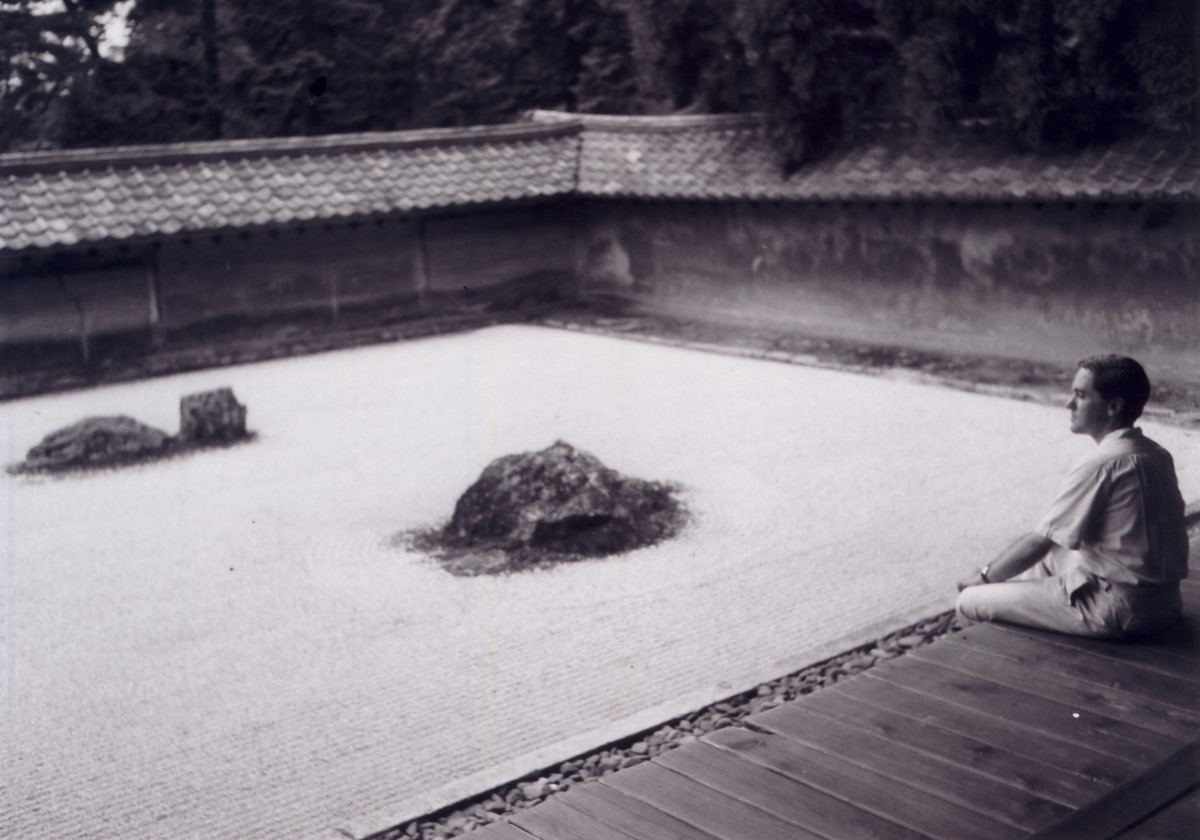
Donald Keene at 31 years old, visiting Ryoanji temple in Kyoto in August 1953
“My Kyogen lessons cost ¥1,000 a month plus the teacher’s streetcar fare,” he writes, “and this entitled me to four private lessons of about two hours each a month. (At the time ¥1,000 was less than three dollars.) Five years later, when I studied No in Tokyo with Sakurama Michio, later designated as a human national treasure, the fee had shot up to ¥3,000 … not a princely sum.”
Seiki, 73, who has been working on a biographical timeline of Keene at the Memorial Foundation, said: “I always wanted to know when he received Sakurama-san’s training. Now I know.”
Life in Kyoto is described in concrete terms, and Keene, who was by no means wealthy, took pleasure in everyday luxuries, such as when he would take a cab from Kyoto Station.
“When I got into a taxi at Kyoto Station and gave directions, the driver would generally ask “Shall I take the good road? [The] meaning of his question was that if he took the shortest route it would cost the minimum of ¥60, but if he went by paved streets it would cost ¥70. What a delightful sensation of extravagance one could have by grandly opting for the good road, at a cost of about three cents.”
But there were other, more disagreeable sides to Kyoto living. Foreigners were still a rarity in those days, and Keene was subjected to curious glances wherever he went.
“When I rode on the Kyoto streetcars I was occasionally offered a seat, especially by elderly people,” he recalls. “Children in the streets often called out after me, ‘Shinchugun!’ (Occupation Army), not with unfriendly intent but as a sign they had recognized my alienness.”
When he went to a famous ryotei restaurant in Kyoto, he wore Japanese dress in honor of the place — but when everyone else was served the sashimi course, he was presented with a boiled fish. “It was assumed that, Japanese costume or no, a foreigner would be unable to eat raw fish. I have not been subjected to this humiliation since,” he remarks.
He stresses the importance of equality in human relations, saying, “People belonging to different nationalities need not be treated like visitors from Mars.”
He writes that many Japanese had an inferiority complex toward other countries at the time, that the literary world and the intellectual class were dominated by Marxism, and that he himself was criticized as an “aristocratic, petit-bourgeois, decadent westerner.” Against this backdrop, he pursued his career as a scholar of Japanese literature, interacting with such distinguished writers as Yukio Mishima, Kobo Abe and Kenzaburo Oe.
“In recollection I become aware how fantastically lucky I was to have appeared in Japan just when I did,” he says. He speaks of his good fortune to “have enjoyed Kyoto in those days, to have known the writers I have known, to have been given unlimited opportunities to publish anything I cared to write about Japanese literature.”
Yukio Kakuchi, 75, who translated many of Keene’s books, commented: “I think the article wasn’t published because it wasn’t good enough for a literary magazine piece. It is a social commentary in the style of articles he wrote for the New York Times for 30 years until 1987.”
Top Articles in JN Specialities
-

Tokyo University of the Arts Now Offering Free Guided Tour of New Storage Building, Completed in 2024
-
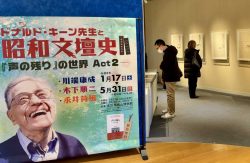
Exhibition Shows Keene’s Interactions with Showa-Era Writers in Tokyo, Features Newspaper Columns, Related Materials
-

The Japan News / Weekly Edition (1/30-2/5)
-

Step Back in Time at Historical Estate Renovated into a Commercial Complex in Tokyo
-

Prevent Accidents When Removing Snow from Roofs; Always Use Proper Gear and Follow Safety Precautions
JN ACCESS RANKING
-

Japan PM Takaichi’s Cabinet Resigns en Masse
-

Japan Institute to Use Domestic Commercial Optical Lattice Clock to Set Japan Standard Time
-

Israeli Ambassador to Japan Speaks about Japan’s Role in the Reconstruction of Gaza
-

Man Infected with Measles Reportedly Dined at Restaurant in Tokyo Station
-

Videos Plagiarized, Reposted with False Subtitles Claiming ‘Ryukyu Belongs to China’; Anti-China False Information Also Posted in Japan
